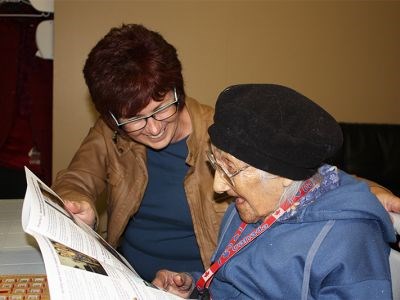With a focus on action, two weeks ago a small North East LHIN team travelled to our region’s most northerly communities along James and Hudson Bay to meet with Chiefs, Elders, health-care and community leaders, and other residents.
We wanted to gain a better understanding of the gaps in health-care delivery along the coast, with a special focus on seniors’ care (elders).
We saw and spoke with many people in a short time. I met again in Moosonee with one of oldest residents of our region — Margaret “Granny” Wabano, who I’m pleased to report, is now 109. (That’s her looking and laughing at her photo in our new NE LHIN strategic plan.)
Our team included Dr. Samir Sinha, who is leading Ontario’s Seniors’ Strategy; two geriatricians from our region — Dr Jo-Anne Clarke and Dr. Janet McElhaney; our LHIN primary care lead, Dr. Alan McLean; and three LHIN staff, including myself. We were joined by Dr. John Waddell, Interim Chief of Staff at Weeneebayko Area Health Authority (WAHA).
The visit was productive. We met thoughtful Elders and concerned community members for one-on-one discussions, we shared ideas on health-care programs and services that need attention, we had candid conversations about gaps in services and opportunities to improve service delivery, and we came home with a plan of immediate action that will help to inform our NE LHIN decisions.
One common thread expressed during our conversations in these coastal communities was the need and desire to work together to build a system that holds a higher standard of care and a stronger continuum of quality care.
We learned how to move forward with a LHIN priority from our 2013-2016 Integrated Health Service Plan (IHSP) — enhancing access and co-ordination of care for our region’s Aboriginal/First Nation/Métis people.
Dr. Sinha gathered information to help inform a Provincial Aboriginal Seniors’ Strategy, recognizing the unique needs of older Aboriginal peoples.
I have prepared a summary of the common issues we heard. Some involve training that’s needed to fully use telemedicine units to provide access to specialized care — a great response for serving isolated and remote areas of our region — and others involve tools and equipment to better meet the needs of our most Northern residents.
We are already at work on NE LHIN responses to implement immediately to improve health care in the area. I’ll report back soon.
Wishing you signs of spring’s hopeful approach.
Louise Paquette is CEO of the North East Local Health Integration Network (NE LHIN).
